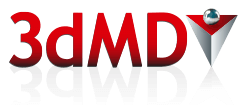Date: September 2017.
Source: Journal of Craniofacial Surgery, doi: 10.1097/SCS.0000000000003869.
Abstract: Le Fort II distraction with zygomatic repositioning introduced the ability to restore central midfacial height and convexity independent of changes in orbital morphology. This study analyzes midfacial and orbital morphology before and after Le Fort II distraction with zygomatic repositioning.
All patients who underwent Le Fort II Distraction with zygomatic repositioning between 2013 and 2015 were included. Two- and 3-dimensional measurements were made using 3dMD Vultus software to assess canthal tilt, nasolabial angle, ratio of midfacial to lower facial height, and absolute change in nasal length. Presence of an open bite and Angle classification were assessed before and after surgery.
Four patients underwent segmental midface advancement using Le Fort II distraction with zygomatic repositioning. Associated diagnoses included Apert syndrome, Goldenhar syndrome, and achondroplasia. Changes in facial dimensions included: 3.19[degrees] improvement in canthal tilt (range -4.7[degrees] to 8.4[degrees]), 9[degrees] change in nasolabial angle (range -1.0[degrees] to 19[degrees]), and 0.69 cm increase in absolute nasal length (range 0.2-0.94 cm). Mean ratio of midfacial to lower facial height was 0.79 preoperatively and 0.89 postoperatively. Preoperatively, all patients demonstrated Angle class III with 3 of 4 patients demonstrating anterior open bite. All achieved closure of open bite and demonstrated class I or II occlusion. No complications were observed.
Le Fort II distraction with zygomatic repositioning resulted in normalization of midfacial soft tissue landmarks. This form of advancement demonstrates the ability to selectively improve midfacial height and canthal tilt while restoring normal occlusion.
Article: A Three-Dimensional Study of Midfacial Changes Following Le Fort II Distraction With Zygomatic Repositioning in Syndromic Patients.
Authors: Smartt, James M. Jr MD; Campbell, Carey MD; Hallac, Rami PhD; Alford, Jake BS; Derderian, Christopher A. MD.
Training AI, Wearing Tech,
and Imaging Health.
- Home
- Products
- Customers
- Customer Research
- Healthcare to Artificial Intelligence
- Blog/News
- Contact Us
